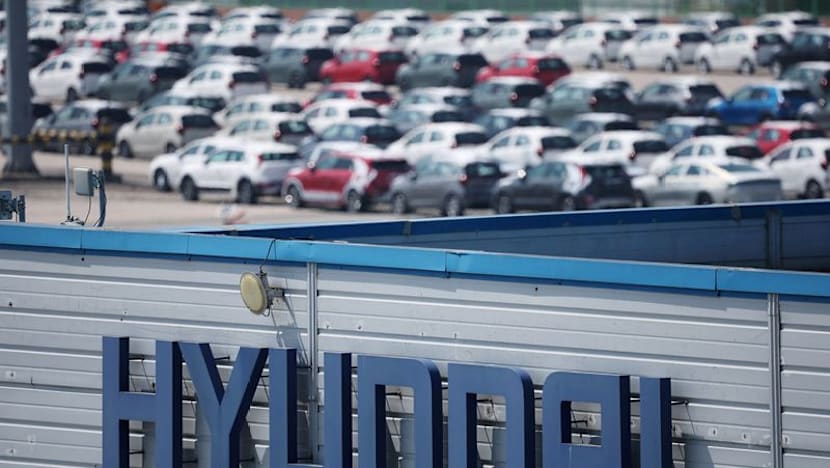Top Stories
South Korea Raises Concerns Over Hyundai’s U.S. Investment Plans

South Korea’s government has raised concerns regarding Hyundai’s recent announcement of a significant increase in its investment plans in the United States. The announcement, which involves a rise to $11.6 billion, coincides with ongoing sensitive trade negotiations between Seoul and Washington.
During a parliamentary session on March 12, 2024, South Korea’s Industry Minister Kim Jung-kwan stated that the government had communicated its regret to Hyundai regarding the timing of the investment announcement. “We told Hyundai that its conduct was deeply regrettable, especially considering that our efforts have been made for the sake of Hyundai and Kia’s industry,” Kim remarked in response to questions. He added that he believes Hyundai now understands the sentiments of the Korean public.
The minister did not elaborate on Hyundai’s response to the government’s concerns. Hyundai has yet to comment on the matter, leaving questions about the automaker’s stance during this period of delicate negotiations.
Independent lawmaker Kim Jong-min criticized Hyundai for allegedly attempting to curry favor with the Trump administration, which he suggested could undermine South Korea’s negotiating power in the trade talks. “Isn’t the Korea–U.S. tariff negotiation essentially a negotiation concerning Hyundai?” he asked, emphasizing that the company’s actions were not conducive to the ongoing discussions.
Last month, Hyundai announced its plan to raise its U.S. investment by 32 percent, shortly after U.S. immigration authorities raided its new electric car battery factory in Georgia. The raid resulted in the arrest of hundreds of workers and created a wave of concern throughout South Korea, a key ally of the United States and a substantial investor in the country.
The backdrop of these negotiations includes substantial U.S. investments of approximately $350 billion that South Korea is addressing as part of discussions aimed at reducing tariffs on automobiles, which represent a critical export for the nation.
Hyundai’s investment strategy in the U.S. has developed significantly over the past year. In March 2023, the automaker’s parent group announced a staggering $21 billion investment in the United States, coinciding with a meeting with former President Donald Trump at the White House. Later that month, Trump introduced a 25 percent tariff on imported vehicles, further complicating the landscape for South Korean manufacturers.
Following a summit between Trump and South Korean President Lee Jae Myung in August 2023, Hyundai revealed plans to increase its overall investment to $26 billion. The automaker is responding to the evolving tariff situation by planning to produce over 80 percent of the vehicles it sells in the U.S. within the country by 2030. This strategic shift includes ramping up the capacity of its Georgia plant.
As trade negotiations continue, the implications of Hyundai’s investment decisions will likely remain a focal point in discussions between South Korea and the United States. The balancing act between fostering domestic industry interests and navigating international trade relations is poised to challenge both governments in the coming months.
-

 Business5 months ago
Business5 months agoKenvue Dismisses CEO Thibaut Mongon as Strategic Review Advances
-

 Lifestyle4 months ago
Lifestyle4 months agoHumanism Camp Engages 250 Youths in Summer Fest 2025
-

 Sports4 months ago
Sports4 months agoDe Minaur Triumphs at Washington Open After Thrilling Comeback
-

 Sports5 months ago
Sports5 months agoTupou and Daugunu Join First Nations Squad for Lions Clash
-

 Top Stories5 months ago
Top Stories5 months agoColombian Senator Miguel Uribe Shows Signs of Recovery After Attack
-

 World5 months ago
World5 months agoASEAN Gears Up for Historic Joint Meeting of Foreign and Economic Ministers
-

 Health4 months ago
Health4 months agoNew Study Challenges Assumptions About Aging and Inflammation
-

 Business5 months ago
Business5 months agoOil Prices Surge Following New EU Sanctions on Russia
-

 Entertainment4 months ago
Entertainment4 months agoDetaşe-Sabah Violin Ensemble Captivates at Gabala Music Festival
-

 Entertainment4 months ago
Entertainment4 months agoBaku Metro Extends Hours for Justin Timberlake Concert
-

 Top Stories5 months ago
Top Stories5 months agoRethinking Singapore’s F&B Regulations Amid Business Closures
-

 Business5 months ago
Business5 months agoU.S. House Approves Stablecoin Bill, Sends to Trump for Signature









